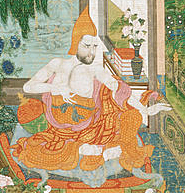Bhāvaviveka: Difference between revisions
*>Will (New page: Category:Indian authors) |
No edit summary |
||
| (27 intermediate revisions by 4 users not shown) | |||
| Line 1: | Line 1: | ||
[[ | {{Person | ||
|MainNamePhon=Bhāvaviveka | |||
|SortName=Bhāvaviveka | |||
|MainNameTib=ལེགས་ལྡན་འབྱེད་ | |||
|MainNameWylie=legs ldan 'byed | |||
|OtherNames=Bhāviveka | |||
|PersonType=Classical Indian Authors | |||
|images=File:Acarya Bhavaviveka PhiladelphiaMuseumofArt2.jpg | |||
|YearBirth=500 | |||
|YearDeath=578 | |||
|BdrcLink=https://www.tbrc.org/#!rid=P0RK301 | |||
|HasDrlPage=Yes | |||
|HasLibPage=No | |||
|HasRtzPage=No | |||
|HasDnzPage=No | |||
|HasBnwPage=Yes | |||
|pagename=Bhāvaviveka | |||
|MainNameSkt=Bhāvaviveka | |||
|MainNamePin=Qingbian | |||
|MainNameJapTranslit=Shöben | |||
|MainNameKorTranslit=Ch’ǒngbyǒn | |||
|AltNamesWylie=legs ldan; skal ldan | |||
|AltNamesTib=ལེགས་ལྡན་; སྐལ་ལྡན་ | |||
|AltNamesOther=Bhāviveka; Bhavya | |||
|ReligiousAffiliation=Svātantrika Madhyamaka | |||
|StudentOf=Klu grub | |||
|TeacherOf=Dpal sbas | |||
|BnwShortPersonBio=Also known as Bhāviveka and Bhavya, an important Indian master of the Madhyamaka school, identified in Tibet as a proponent of Svātantrika Madhyamaka and, within that, of Sautrāntika-Svātantrika-Madhyamaka. He is best known for two works. The first is the ''Prajñāpradīpa'', his commentary on [[Nāgārjuna]]’s ''Mūlamadhyam- akakārikā''; this work has an extensive subcommentary by [[Avalokitavrata]]. Although important in its own right as one of the major commentaries on the central text of the Madhyamaka school, the work is most often mentioned for its criticism of the commentary of Buddhapālita on the first chapter of Nāgārjuna’s text, where Bhāvaviveka argues that it is insufficient for the Madhyamaka only to state the absurd consequences (''prasaṅga'') that follow from the position of the opponent . . . The other major work of Bhāvaviveka is his ''Madhyamakahṛdaya'', written in verse, and its prose autocommentary, the ''Tarkajvālā''. The ''Madhyamakahṛdaya'' is preserved in both Sanskrit and Tibetan, the ''Tarkajvālā'' only in Tibetan. It is a work of eleven chapters, the first three and the last two of which set forth the main points in Bhāvaviveka’s view of the nature of reality and the Buddhist path, dealing with such topics as bodhicitta, the knowledge of reality (''tattvajñāna''), and omniscience (''sarvajñātā''). The intervening chapters set forth the positions (and Bhāvaviveka’s refutations) of various Buddhist and non-Buddhist schools, including the śrāvaka, Yogācāra, Sāṃkhya, Vaiśeṣika, Vedānta, and Mīmāṃsā. These chapters (along with Śāntarakṣita’s ''Tattvasaṃgraha'') are an invaluable source of insight into the relations between Madhyamaka and other contemporary Indian philosophical schools, both Buddhist and non-Buddhist. (Source: "Bhāvaviveka." In ''The Princeton Dictionary of Buddhism'', 114. Princeton University Press, 2014. http://www.jstor.org/stable/j.ctt46n41q.27.) | |||
|PosBuNayDefProv=Provisional | |||
|PosBuNayDefProvNotes="Bhāviveka contends that the teaching that all sentient beings have Buddha-nature implies merely that emptiness, signlessness, and wishlessness, etc., abide in the minds of all sentient beings; it does not presuppose an inherent eternal ''puruṣa'' pervading everything." [[Kano, K.]] [[Buddha-Nature and Emptiness]], p. 8. | |||
|PosAllBuddha=Yes | |||
|PosAllBuddhaMoreNotes=See [[Kano, K.]] [[Buddha-Nature and Emptiness]], p. 8. | |||
|PosEmptyLumin=Tathāgatagarbha was Taught Merely to Encourage Sentient Beings to Enter the Path | |||
|IsInGyatsa=No | |||
}} | |||
Latest revision as of 11:27, 14 July 2023
| PersonType | Category:Classical Indian Authors |
|---|---|
| MainNamePhon | Bhāvaviveka |
| MainNameTib | ལེགས་ལྡན་འབྱེད་ |
| MainNameWylie | legs ldan 'byed |
| MainNameSkt | Bhāvaviveka |
| MainNamePin | Qingbian |
| SortName | Bhāvaviveka |
| AltNamesTib | ལེགས་ལྡན་ · སྐལ་ལྡན་ |
| AltNamesWylie | legs ldan · skal ldan |
| AltNamesOther | Bhāviveka · Bhavya |
| YearBirth | 500 |
| YearDeath | 578 |
| ReligiousAffiliation | Svātantrika Madhyamaka |
| StudentOf | Klu grub |
| TeacherOf | Dpal sbas |
| BDRC | https://www.tbrc.org/#!rid=P0RK301 |
| IsInGyatsa | No |
| BnwShortPersonBio | Also known as Bhāviveka and Bhavya, an important Indian master of the Madhyamaka school, identified in Tibet as a proponent of Svātantrika Madhyamaka and, within that, of Sautrāntika-Svātantrika-Madhyamaka. He is best known for two works. The first is the Prajñāpradīpa, his commentary on Nāgārjuna’s Mūlamadhyam- akakārikā; this work has an extensive subcommentary by Avalokitavrata. Although important in its own right as one of the major commentaries on the central text of the Madhyamaka school, the work is most often mentioned for its criticism of the commentary of Buddhapālita on the first chapter of Nāgārjuna’s text, where Bhāvaviveka argues that it is insufficient for the Madhyamaka only to state the absurd consequences (prasaṅga) that follow from the position of the opponent . . . The other major work of Bhāvaviveka is his Madhyamakahṛdaya, written in verse, and its prose autocommentary, the Tarkajvālā. The Madhyamakahṛdaya is preserved in both Sanskrit and Tibetan, the Tarkajvālā only in Tibetan. It is a work of eleven chapters, the first three and the last two of which set forth the main points in Bhāvaviveka’s view of the nature of reality and the Buddhist path, dealing with such topics as bodhicitta, the knowledge of reality (tattvajñāna), and omniscience (sarvajñātā). The intervening chapters set forth the positions (and Bhāvaviveka’s refutations) of various Buddhist and non-Buddhist schools, including the śrāvaka, Yogācāra, Sāṃkhya, Vaiśeṣika, Vedānta, and Mīmāṃsā. These chapters (along with Śāntarakṣita’s Tattvasaṃgraha) are an invaluable source of insight into the relations between Madhyamaka and other contemporary Indian philosophical schools, both Buddhist and non-Buddhist. (Source: "Bhāvaviveka." In The Princeton Dictionary of Buddhism, 114. Princeton University Press, 2014. http://www.jstor.org/stable/j.ctt46n41q.27.) |
| PosBuNayDefProv | Provisional |
| PosBuNayDefProvNotes | "Bhāviveka contends that the teaching that all sentient beings have Buddha-nature implies merely that emptiness, signlessness, and wishlessness, etc., abide in the minds of all sentient beings; it does not presuppose an inherent eternal puruṣa pervading everything." Kazuo Kano Buddha-Nature and Emptiness, p. 8. |
| PosAllBuddha | Yes |
| PosAllBuddhaMoreNotes | See Kazuo Kano Buddha-Nature and Emptiness, p. 8. |
| PosEmptyLumin | Tathāgatagarbha was Taught Merely to Encourage Sentient Beings to Enter the Path |
| Other wikis |
If the page does not yet exist on the remote wiki, you can paste the tag |

